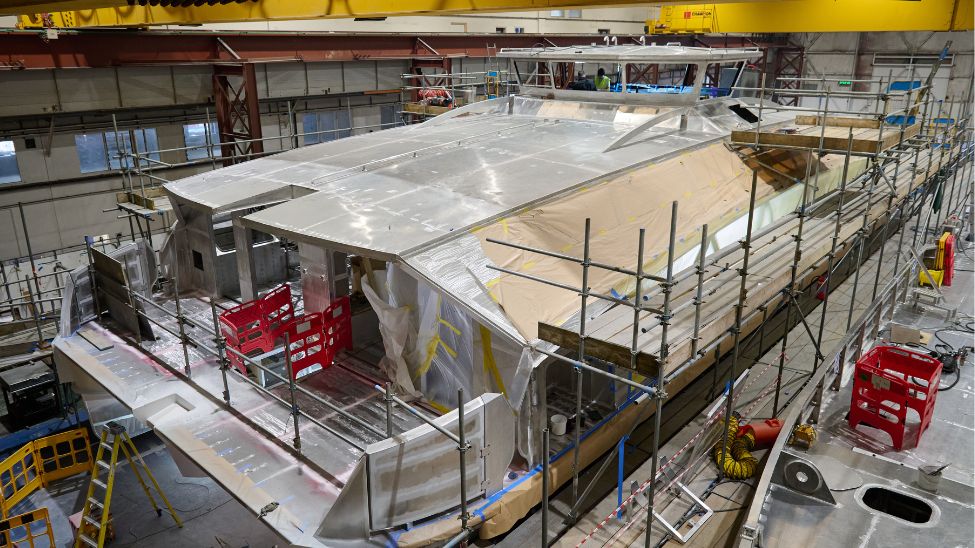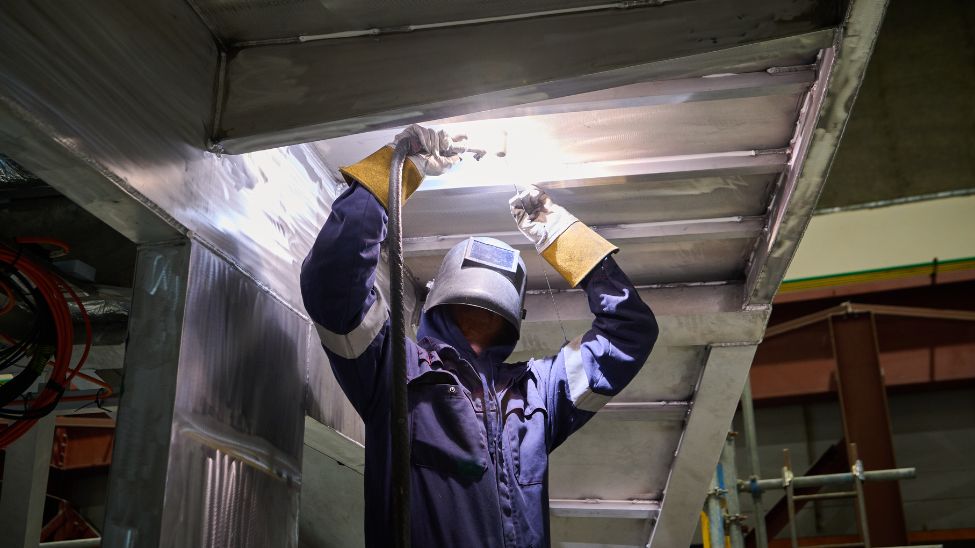By
Alex Smith |
Uber Boat by Thames Clippers is to launch the UK's first all-electric ferry, Orbit Clipper, in March 2025.
Orbit Clipper is currently under construction at Wight Shipyard in East Cowes, Isle of Wight. CFR visited the shipyard to see the progress on the vessel, which is being built from lightweight aluminium.
Once delivered, the ship will operate the short point-to-point route operate between London’s Canary Wharf on the north side of the Thames and Rotherhithe on the south. The vessel will cross the river every 10 minutes from each side on weekdays and every 15 minutes at weekends, carrying over 20,000 passengers every day.
The new electric vessel will replace the current, diesel-powered ferry, reducing emissions on the route. The project marks a step in Uber Boat by Thames Clippers’ goal to reduce emissions by 50 per cent by 2035 and achieve net-zero by 2050.
“This zero-emission solution also comes after the recent launch of our third hybrid boat – Mars Clipper – into our main River Bus fleet and is the next step on our journey to advancing sustainable maritime technology,” said Sean Collins, co-founder and CEO of Uber Boat by Thames Clippers. “The Thames is the lifeblood of our great capital and it’s our ambition to continue to push for further progression along the river – we’re calling upon London’s maritime businesses and government bodies to collaborate and ensure a greener future for all.”

Uber Boat by Thames Clippers
Orbit Clipper is under construction at Wight Shipyard on the Isle of Wight
The 150-passenger ferry will have capacity for 100 bicycles and features a ro-ro design that enables automated docking on both sides of the Thames. This configuration will enable greater accessibility, shorten journey times and increase passenger capacity. new step-free pontoon will also be built on the south side of the river at Rotherhithe as part of the project, while the existing pier at Canary Wharf will be modified to accommodate the new fully electric ferry berth.
Geoff Symonds, COO of Uber Boat by Thames Clippers, told CFR that passengers using the service should expect to see a significant improvement following the debut of the new ship.
“The new pier will be the right gradient for wheelchair users to access, unlike the existing infrastructure,” he said. “We’re also working with the mayor’s office on signage to guide cyclists towards the ferry, as it should significantly reduce their journey time compared to the current ways across the Thames."
Orbit Clipper is the seventh ship constructed in the partnership between Uber Boat by Thames Clippers and Wight Shipyard, with its predeccessors including three hybrid vessels.
“At Wight Shipyard we’re thrilled to strengthen our partnership with Uber Boat by Thames Clippers by building its first zero-emission vessel,” said Toby Mumford, CEO of Wight Shipyard. “This was our first build accessing the Innovate UK grant funding in partnership with Uber Boat by Thames Clippers, Beckett Rankine and Aqua superPower. Having already delivered six vessels, of which three are hybrid boats, for the fleet, this milestone represents not only a significant step forward for sustainable maritime innovation in the UK but also highlights the international potential for British-built electric vessels. We hope and expect that it is the first of many.”

Uber Boat by Thames Clippers
Orbit Clipper will be completed in March 2025
Speaking with CFR, Mumford highlighted the opportunity for Wight Shipyard in producing further electric vessels following its experience with Orbit Clipper.
“We’ve made the first step with Uber Boats by Thames Clippers, and its really exciting to have done that with such a long-standing client,” he said. “We are hoping to be able to build many more electric ships off the back of this experience. I think we have an advantage as a shipbuilder experienced in building aluminium vessels, which are lighter and therefore more able to absorb the weight of the batteries. I think in the future, we’ll see a lot more conventional vessels being built in aluminium as a result.”
Electric infrastructure specialists Aqua superPower developed the technology to provide power to the vessel, marking the company’s first project in commercial shipping.
“This ship is testament to the knowledge and dedication of the project partners in overcoming the challenges to make it a reality,” said Matt Holland, chief project engineer at Aqua superPower, to CFR. “Our technology has come on leaps and bounds, both onshore and on the water, getting bigger and better. We’ve had so much interest from other operators over the course of the project, and it shows that it has helped to create knowledge in the UK that can now be exported to be used worldwide.”